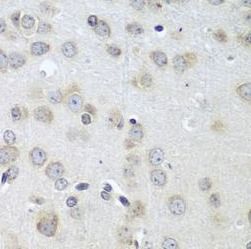FineTest
SKU(재고 관리 코드):FNab00083
anti- ACHE antibody
anti- ACHE antibody
Explore the intricacies of neuronal function with our Anti-ACHE Antibody. With a substantial 100µg supply, this antibody empowers you to delve into acetylcholinesterase (ACHE) and its essential role in neurotransmitter regulation and cholinergic signaling.
ACHE is a vital enzyme responsible for breaking down the neurotransmitter acetylcholine, crucial for proper neuronal communication. Our antibody is precision-engineered to specifically target ACHE with remarkable precision and sensitivity. Thoroughly validated, it ensures consistent and dependable results, instilling confidence in your exploration of cholinergic pathways.
Utilizing state-of-the-art techniques, this antibody is sourced from rabbit hosts, offering a polyclonal clonality that enhances its range of binding capabilities. Its versatility makes it an ideal choice for various applications, including Western blotting, immunohistochemistry, and immunofluorescence assays.
Whether you're investigating cholinergic neurotransmission mechanisms, studying neuronal signaling, or exploring diseases related to ACHE dysregulation, our Anti-ACHE Antibody is your steadfast research companion. Its high-quality formulation and generous 100µg size ensure it is an indispensable asset for your laboratory, enabling groundbreaking discoveries and contributions to neurobiology.
Empower your research with the precision and reliability of our Anti-ACHE Antibody. Secure your 100µg supply today and embark on a journey of discovery with confidence.
Product Name
ACHE antibody
Size
100µg
Form
liquid
Purification
Immunogen affinity purified
Purity
≥95% as determined by SDS-PAGE
Host
Rabbit
Clonality
polyclonal
Isotype
IgG
Storage
PBS with 0.02% sodium azide and 50% glycerol pH 7.3, -20℃ for 12 months (Avoid repeated freeze / thaw cycles.)
BACKGROUND
Acetylcholinesterase hydrolyzes the neurotransmitter, acetylcholine at neuromuscular junctions and brain cholinergic synapses, and thus terminates signal transmission. It is also found on the red blood cell membranes, where it constitutes the Yt blood group antigen. Acetylcholinesterase exists in multiple molecular forms which possess similar catalytic properties, but differ in their oligomeric assembly and mode of cell attachment to the cell surface. It is encoded by the single ACHE gene, and the structural diversity in the gene products arises from alternative mRNA splicing, and post-translational associations of catalytic and structural subunits. The major form of acetylcholinesterase found in brain, muscle and other tissues is the hydrophilic species, which forms disulfide-linked oligomers with collagenous, or lipid-containing structural subunits. The other, alternatively spliced form, expressed primarily in the erythroid tissues, differs at the C-terminal end, and contains a cleavable hydrophobic peptide with a GPI-anchor site. It associates with the membranes through the phosphoinositide (PI) moieties added post-translationally.
IMMUNOGEN INFORMATION
Immunogen
acetylcholinesterase (Yt blood group)
Synonyms
Acetylcholinesterase, ACHE, ARACHE, N ACHE, YT
Observed MW
71 kDa
APPLICATION
Tested Application
ELISA, WB, IHC
Recommended Dilution
WB: 1:500 - 1:2000; IHC: 1:50 - 1:100
UNIPROT INFORMATION
UniProt ID
IMAGES

Immunohistochemistry of paraffin-embedded mouse brain tissue slide using FNab00083( ACHE Antibody) at dilution of 1:100

mouse liver tissue were subjected to SDS PAGE followed by western blot with FNab00083(ACHE antibody) at dilution of 1:1000
Share


